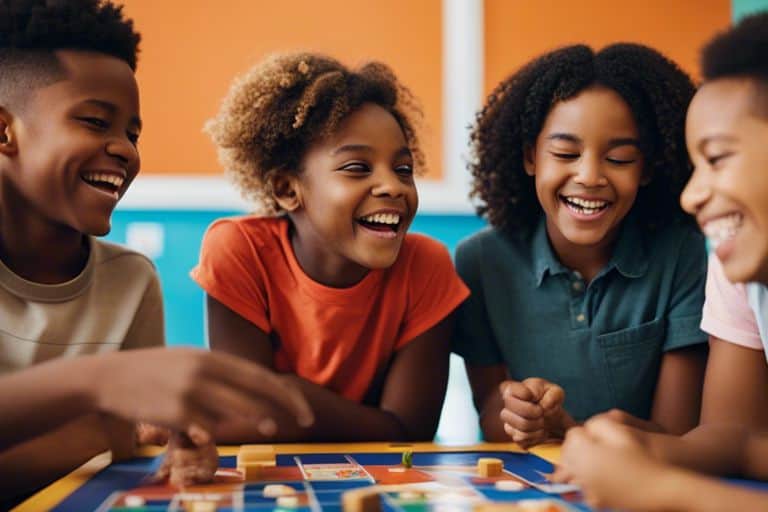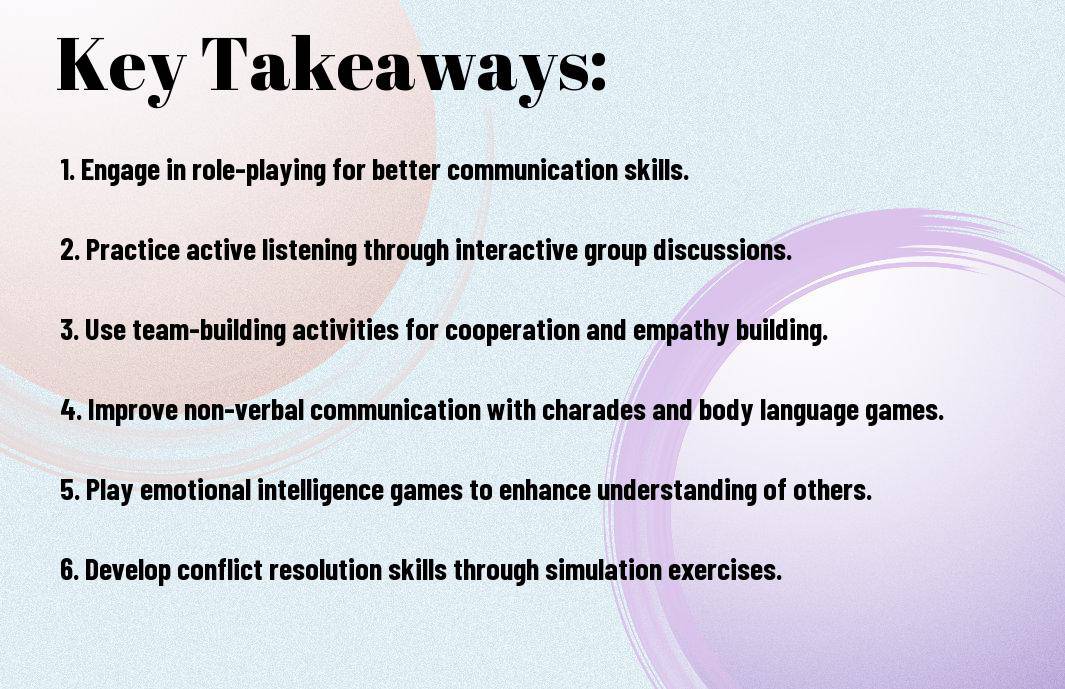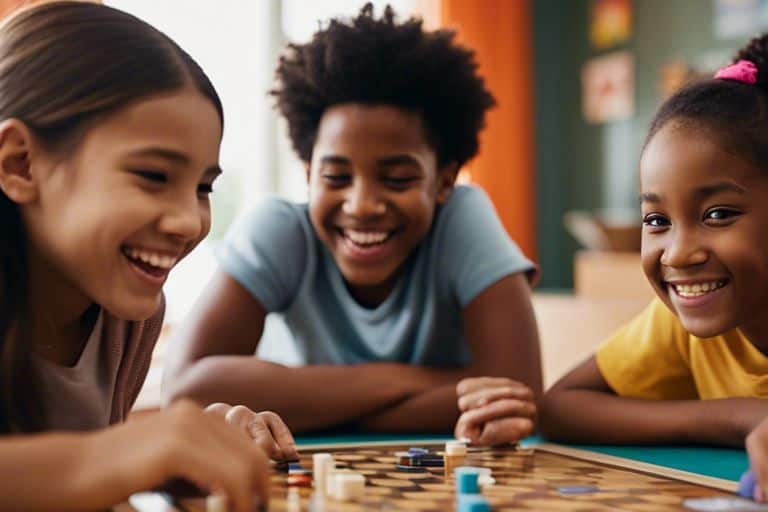Obtaining social skills is vital for individuals to thrive in their personal and professional lives. One of the best ways to foster these skills is through Using Games to Teach Social Emotional Skills. Participating in activities and games not only makes learning social skills more enjoyable, but also allows for practical application and real-life scenarios. Engaging in these games and activities enables individuals to develop communication, empathy, cooperation, and conflict resolution skills in a relaxed and fun environment. In this blog post, we will explore some effective games and activities to help you or others enhance their social skills and ultimately thrive in various social settings.
Key Takeaways:
- Developing Social Skills: Engaging in activities and games can greatly aid in the development of essential social skills.
- Communication and Teamwork: These activities and games can promote effective communication and teamwork among individuals, fostering a positive social environment.
- Confidence and Empathy: Participation in such activities and games can also help in building confidence and empathy, crucial for healthy social interactions.


Understanding Social Skills
Social skills are a crucial aspect of human interaction, encompassing the ability to communicate effectively, build and maintain relationships, and navigate a variety of social situations. Developing and honing social skills is essential for success in both personal and professional contexts.
Components of Social Interaction
Effective social interaction is built upon several key components, including verbal and nonverbal communication, active listening, empathy, and the ability to interpret and respond to social cues. Verbal communication involves not only the words we use, but also our tone, pitch, and volume. Nonverbal communication encompasses body language, facial expressions, and gestures, all of which play a crucial role in conveying messages and understanding others. Active listening is essential for demonstrating interest and understanding in conversations, while empathy allows us to put ourselves in others’ shoes and respond with compassion. The ability to interpret and respond to social cues involves understanding and reacting appropriately to the verbal and nonverbal signals others give.
The Role of Emotional Intelligence
Emotional intelligence plays a significant role in shaping our social interactions. It involves the ability to recognise, understand, and manage our own emotions, as well as the emotions of others. Individuals with high emotional intelligence are adept at regulating their emotions, expressing themselves effectively, and navigating complex social situations with empathy and understanding.
Emotional intelligence is a crucial component of social skills development and is linked to numerous positive outcomes, including enhanced relationships, conflict resolution, and success in leadership roles.

Activities to Enhance Social Skills
Enhancing social skills is crucial for both children and adults to thrive in social situations. Engaging in various activities and games can be a fun and effective way to develop these skills. One resource that offers an array of activities and exercises for kids is 15 Fun Social Skills Activities & Exercises for Kids.
Role-Playing Exercises
Role-playing exercises provide a safe space for individuals to practice social interactions in different scenarios. This can help them understand perspectives, improve communication, and develop problem-solving skills. By taking on different roles, individuals can also gain empathy and a better understanding of diverse viewpoints.
When conducting role-playing exercises, it is important to create a supportive environment where participants feel comfortable expressing themselves. Encouraging open-mindedness and active listening can lead to significant improvements in social skills and empathy.
Team-Building Activities
Team-building activities are designed to encourage collaboration, communication, and trust among participants. These activities can range from problem-solving challenges to group exercises that promote teamwork and cooperation. By engaging in such activities, individuals can learn to work effectively with others, build strong relationships, and develop essential social skills.
It is important to select team-building activities that are inclusive and considerate of individual differences. By creating a positive and inclusive atmosphere, participants can feel valued and motivated to engage in the activities.
Games to Encourage Social Development
Board Games and Group Dynamics
Board games are a fantastic tool for promoting social development in children. They encourage collaboration, communication, and problem-solving, all of which are essential for building strong social skills. When children play board games in a group, they learn to take turns, follow rules, and consider the feelings and opinions of others. These experiences help them develop a sense of empathy and respect for their peers, as well as an understanding of group dynamics.
Furthermore, board games provide a platform for children to practice good sportsmanship and learn how to gracefully handle both success and failure. They also offer opportunities for children to express their creativity and imagination, fostering a positive and inclusive social environment.
Technology-Based Social Skills Games
Technology-based social skills games, such as interactive apps and online multiplayer games, can also play a valuable role in supporting social development. These games provide a medium for children to engage in social interactions and collaborate with others in a virtual environment. With the right guidance and supervision, children can learn to communicate effectively, work as part of a team, and resolve conflicts constructively, all while enjoying the benefits of technology.
However, it is important to be mindful of the potential dangers associated with technology-based social skills games. Parents and educators should monitor the content and conduct of these games to ensure they align with positive social values and do not expose children to inappropriate behaviour. By striking the right balance between technology and social skills development, children can benefit from the engaging and educational aspects of these games while also building essential interpersonal skills.
Implementing Social Skills Training
When it comes to implementing social skills training, it is essential to incorporate a variety of activities and games into the learning process. These interactive methods not only make the training more enjoyable for participants, but also help to reinforce the concepts being taught. For a comprehensive list of 31 social skills activities and games for kids, visit 31 Social Skills Activities and Games for Kids (Young …
In School Settings
Implementing social skills training in school settings can be highly beneficial for students. Teachers can use role-playing exercises, group activities, and collaborative projects to promote positive interaction and communication among students. Furthermore, incorporating these activities into the regular curriculum can help to create a supportive and inclusive learning environment.
At Home and In the Community
Parents and caregivers play a crucial role in reinforcing social skills training at home and in the community. By organising family game nights, community outings, and volunteer activities, they can provide opportunities for children to practice their social skills in real-life situations. These interactions help to develop empathy, cooperation, and problem-solving abilities, which are essential for building meaningful relationships.
It is important for parents, teachers, and caregivers to consistently reinforce social skills training at home and in the community. By creating a supportive and encouraging environment, children can develop the necessary skills to thrive in various social settings, ultimately leading to a more positive and fulfilling life.
Conclusion: Developing Social Skills – Activities and Games
In conclusion, it is crucial for individuals to develop their social skills in order to navigate through various social environments effectively. Engaging in activities and games that encourage teamwork, communication, empathy, and problem-solving can greatly enhance one’s ability to interact with others. These activities not only provide an opportunity for individuals to practice and improve their social skills, but they also promote a sense of camaraderie and cooperation. By actively participating in these activities, individuals can gain a deeper understanding of their own emotions and behaviours, as well as those of others. It is important to continue actively incorporating such activities into our daily lives in order to continually develop and enhance our social skills for a more harmonious and fulfilling social life.
Developing Social Skills – Activities and Games FAQ
Q: Why are social skills important?
A: Social skills are crucial for effective communication, building relationships, and navigating social situations in everyday life. Developing these skills can enhance personal and professional interactions.
Q: What are some activities for improving social skills?
A: Role-playing exercises, team-building activities, and group discussions are effective ways to practice social skills. Additionally, activities such as volunteering, joining clubs, and attending social events can also help develop social skills.
Q: How do games help in developing social skills?
A: Games encourage interaction, cooperation, and problem-solving, which are essential components of social skills. Board games, team sports, and cooperative video games provide opportunities to practice communication, teamwork, and empathy.
Q: What are some specific social skill areas that can be addressed through activities and games?
A: Activities and games can help improve skills such as active listening, conflict resolution, assertiveness, empathy, and understanding non-verbal cues.
Q: Are there specific activities for children to develop social skills?
A: Yes, activities such as group art projects, role-playing scenarios, team sports, and cooperative games can help children learn essential social skills in a fun and interactive way.
Q: How can adults improve their social skills through activities and games?
A: Adults can participate in group workshops, attend social events, join hobby groups, and engage in team-building exercises to enhance their social skills. Additionally, adult board games, escape rooms, and interactive challenges can also be effective in developing social skills.
Q: Can individuals with social anxiety benefit from social skills activities and games?
A: Yes, individuals with social anxiety can gradually build confidence and improve their social skills through structured activities and games. These provide a supportive and non-threatening environment for practicing social interactions.







